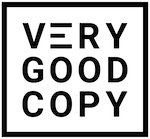
I got hooked on a show called How To with John Wilson.
It’s a docuseries on HBO, part memoir, part essay. Each episode is about 25 minutes or so, and you don’t see the host, John Wilson. He’s behind the camera, filming and narrating.

Never miss a VeryGoodCopy Micro-Article: SUBSCRIBE
Visually, the show is a collage of happenings — some typical, some remarkable — that Wilson witnesses and films around New York City: a man dragging an AC unit down the street; an overturned car on the expressway; a jet fuel fire at the airport; a man hanging upside down, playing a flute; a woman swarmed by pigeons; a man leaning out of his car, vomiting; paramedics dropping a dead body down stairs.
Narratively, Wilson strings this disparate footage together into a cohesive story. And while each episode masquerades as a superficial tutorial (e.g., “How To Make Small Talk” or “How To Split the Check”), the show is actually quite deep, addressing broad issues: sociological things, existential things.
The human condition is on display.
Sometimes it’s strange and sometimes it’s funny and sometimes it’s so poignant you could cry.
I dunno. It’s hard to explain.
I really like it.
Season 2, Episode 4 is called How To Throw Out Your Batteries.
It’s about moving on and parting with things, all sorts of things, normal things, like batteries and propane tanks but also sentimental things, priceless things, like wedding rings.
In the episode, John Wilson shares a personal story about something he’s been trying to part with and forget: his first feature-length student film, which took him three years to make.
The story is about what happened at the premier:
“I introduced the movie,” John says, “and then ran upstairs to man the merch table in case anyone wanted to buy one of the 200 handmade DVDs that we’d prepared for the event. But when the movie was finally over, everyone exited the theater and walked directly past and tried to avoid eye contact with me.”
John says he didn’t sell a single DVD to anyone who came that night. He says his own dad told him it was the worst movie he’d ever seen.
“It was one of the most painful experiences of my entire life,” John said.
It’s painful to watch, too. You feel bad for John, for all the work he did and time he spent, only to be devastated by the reception.
But as a creative person, you also feel hopeful, encouraged that despite his failure, John now has his own show on HBO. And now he’s on Jimmy Kimmel, promoting his work and sharing his process.
Now, John’s an acclaimed filmmaker.
Now, people are calling him a genius.
And speaking of genius:
“My failures far outnumbered my successes,” said copywriter Joe Sugarman. “But it was through these failures that I received a very costly education that to this day has guided me through a successful career.”
Yes.
Onward.

LEARN TO PERSUADE
✅ Join thousands of email subscribers
✅ Less than 0.4% of readers unsubscribe
✅ Never miss a Micro-Article or -Interview
✅ Get instant email access to VGC's founder
✅ Be first in line to get new, free Micro-Courses
DRAYTON BIRD
Global Creative Director @ Ogilvy & Mather
BEN SETTLE
Email Marketing Master
KIM KRAUSE SCHWALM
A-List Direct Response Copywriter
RYAN BONNICI
Forbes 26th Most Influential CMO
SCOTT DIKKERS
Founding Editor @ The Onion 🧅
LISA PIERSON
Partner @ CopyHackers Agency
JUSTIN WELSH
SaaS Advisor & Writer
GODARD ABEL
CEO @ G2.com
DAVID GARFINKEL
A-List Direct Response Copywriter
JORGE SELVA
Director of Growth @ Help Scout
ADAM GOYETTE
Chief Marketing Officer @ Help Scout
TYLER J. KOENIG
Conversion Copywriter
TOMMY WALKER
Editor-in-Chief @ Shopify Plus & CXL
JASON VANA
Founder @ SHFT Marketing
JUSTIN BLACKMAN
Founder @ Pretty Fly Copy
CAMILLE TRENT
Managing Editor @ MarketerHire
NIKHIL NARAYANAN
Creative Director @ Ogilvy & Mather
EDEN BIDANI
Copywriter @ Greenlight Copy
MARK KILENS
VP of Content @ Drift































